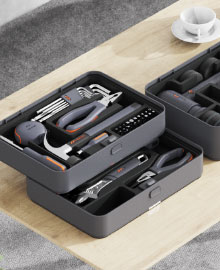
A properly stocked toolbox forms a craftsman's chief possession for primary tasks like measuring planks and fastening screws accurately. This compendium presents expertise to select suitable gear and apply it effectively.
- Commence by gathering a core array of hand tools: hammer, screwdriver, wrench, pliers, saw, tape measure.
- Familiarize yourself with the functionality of each tool and its specific applications.
- Perfect your methods with practical work and slowly increase technical difficulty.
Remember, investing time in mastering hand tools is an investment in your craftmanship. With adequate know-how, tools will amplify your capacity to tackle demanding tasks with accuracy.
Elevate Projects Using Power Tools
Keen to revolutionize tasks? Dive into strong tools that marry precision and operational speed. These must-have tools can change the game for professionals and casual builders alike. From high-torque drills to fine-detail saws, power tools supply varied functions to manage construction jobs easily.
- Use cordless impact drivers for efficient fastening and teardown tasks.
- Perfect use of reciprocating saws to achieve speedy and clean cuts across materials.
- Improve woodworking outcomes via strong planers and jointers providing fine finishes.
Apply power tools to accelerate schedules and attain impressive project finishes.
Accuracy Simplified
In environments valuing finesse, the correct measuring devices determine success. From simple straight edges to high-precision micrometers, essential measuring tools enable accurate realization of concepts. Whether veteran artisan or new hobbyist, mastering essential measuring tools opens many possibilities.
- Survey a diverse selection of measuring tools for every project requirement.
- Familiarize yourself with applications and advantages of each measuring device.
- Develop your skills in accurate measurement and application.
Tool Sets for Every Task
If you're an experienced worker or a weekend DIYer, a suitable toolkit is indispensable. When working on assembly or fastening tasks, the proper kit guarantees better accuracy and safety. To pick an ideal toolset, assess the types of tasks you'll perform regularly.
Are you after an all-in-one collection or a focused set for specific jobs? Once you know what you need, survey options to compare features, build quality and price. Consult online feedback and reviews from users to inform your final choice.
With thorough review and planning, find the optimal kit that empowers confident project completion.
Tune-Up and Care for Essential Hand Tools
Sustaining hand tools in good condition is crucial for any maker. Neglecting your tools can lead to dull edges, broken parts, and frustrating work experiences. Regular maintenance ensures your tools remain in top shape, providing you with years of reliable service. Always clean and clear tools of debris following use to prevent damage. Place tools in dry, protected storage to inhibit rust and corrosion.
- Use a honing stone or file periodically to keep blade edges sharp.
- Apply proper lubricant to moving parts to lessen friction and extend life.
- Assess tool handles for damage and replace defective ones promptly.

By keeping to these maintenance habits you prolong tool life and enjoy smoother project outcomes.
Workshop Essentials: Hand Tools You Need
A complete workshop becomes an inviting workspace for enthusiasts and hobbyists. Although specialized gear benefits projects, foundational hand tools are indispensable. Recommended basics are a reliable hammer, adjustable wrench and quality tape measure for accurate gauging. Have an assortment of screwdrivers, capable pliers and a utility knife for cutting materials. A sturdy saw is key for precise cuts and a level guarantees aligned, even work.
- Home Workshop Essentials: Hand Tools

Power Tool Safety Demystified: Complete Resource
Power tools are capable machines delivering impressive power and operational gains. However, they mandate a detailed understanding of safety protocols. Disregarding safety measures may lead to grave injuries. This manual clarifies safety practices for power tools and equips you to operate safely.
Kick off by learning your tools—read manuals thoroughly and absorb the specific safety features. Make it a rule to equip PPE including eye protection, ear guards and gloves. Inspect and service tools routinely to verify reliable operation.
Recall that safety stands as the primary concern in workshop settings. Observing these practices enables safe, confident operation of power tools.
Choosing the Right Tools for Accurate Measurement
If accuracy is the aim, the measurement instruments you pick are highly influential. A variety of measuring instruments are available, each designed for specific purposes. Grasping features of each tool is crucial to pick wisely. Factors such as accuracy, resolution, and measurement type should be carefully evaluated when selecting the right tool for the job.
- For length accuracy, a tape measure or ruler is usually the go-to tool.
- A protractor is crucial for determining angles accurately.
- Digital calipers provide ideal precision for small-size measurements.
Selecting the correct instruments carefully provides accurate, trustworthy results.
Selecting the Ultimate Toolkit

Selecting a tool collection can bring excitement and occasional overwhelm. With many choices on offer it’s normal to feel overloaded. This thorough resource equips you to select the perfect toolkit for your needs.
To begin, think about the projects you will be performing regularly. Are you experienced or a novice? Clear goal definition helps refine options.
- Employ a blend of power and manual tools to reach productive and precise outcomes Combine hand and power tools strategically for successful and efficient project completion Consider using a mix of power and hand tools to achieve productive, efficient results
- Emphasize primary essential items
- A dependable hammer and optional mallet or sledgehammer
- An adaptable collection of screwdrivers, wrenches and pliers is crucial
- Tape and ruler for measurement tasks
- Leveling tools like level, plumb bob or transit
Consider tool build materials, your budget and the maker's reputation. Keep in mind a durable toolkit is a long-term investment.
Make DIY Easy: Proper Tool Use
Beginning DIY ventures often feels daunting. Still, armed with the right tools and knowledge, tough projects become manageable. Start by familiarizing getting to know learning about your tools. Read guides meticulously and test out basic operations safely. Always prioritize safety as your first consideration. Don protective gear such as goggles, gloves and ear protection to prevent injury.
When picking tools, emphasize long-lasting quality and robustness. Select reputable manufacturers whose tools endure and perform well over years.
Turn to professionals or veteran DIYers at hardware stores for helpful advice. They provide useful tips and insights on selecting the most suitable tools for projects.
- A maintained sharp edge equals safer tool use—keep blades honed.
- Organize and store tools to prevent damage and ensure longevity.
- Expand your skills and knowledge through DIY
Choosing Power Tools vs. Hand Tools: When to Use Each
When working on tasks, choosing power vs hand tools often proves challenging. While heavy-duty power tools bring speed and capability, hand tools stay essential for precision and small tasks. Consult this guide to pick the suitable tool option for the task at hand.
- For detailed, precise work—carving, fitting, intricate fixes—hand tools are ideal. They deliver improved handling and are typically more cost-effective and affordable.
- Power tools excel for fast efficient tasks such as cutting, drilling and sanding large areas. They significantly lower manual labor and shorten project timelines.
Ultimately, choosing the preferred tool relies on the job details, your level and budget. Consider using a mix of power and hand tools to achieve productive, efficient results.
